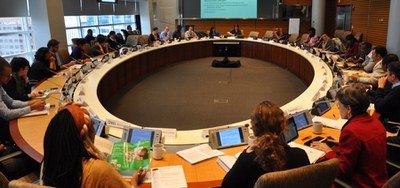FCMC and the Forests Dialogue on REDD+ Benefit-Sharing

Dr. Paula J. Williams, the Senior Director of Social and Environmental Soundness activities for FCMC, participated in TFD initial scoping dialogue on REDD+ benefit-sharing issues from March 23-24, 2013. The event was hosted at the World Bank and co-convened by TFD and IUCN, with support from the German Ministry of Foreign Affairs (BMZ). This meeting was the first in a series of dialogues and was intended to focus on key questions, challenges and opportunities for progress, thus laying the groundwork for further TFD activities on the topic. The series aims to build better understanding of the current state of REDD+ Benefit Sharing and share useful approaches, tools and arrangements to promote equitable and efficient delivery of REDD+ Benefit Sharing.
To launch the substantive discussion, Xiaoting Hou, Program Manager for TFD, highlighted many key issues in benefit-sharing. Xiaoting noted ongoing debates as to whether benefits should only go to those with legal rights or include those without well-defined rights, low-emission forest stewards and/or effective implementers—stressing the need to ensure that benefit sharing is effective, efficient and equitable. Grace Wong (Center for International Research on Forestry [CIFOR]) presented CIFOR’s cross-national studies of REDD+ projects and benefit-sharing issues. National perspectives and experiences were shared from Indonesia, by Iwan Wibisono (Indonesia REDD+ National Task Force); Peru, by Agustin Silvani (Conservation International, CI); and Democratic Republic of Congo (DRC), by Patrick Kipalu (Forests and Peoples Program, FPP).
The rest of the workshop was spent in plenary and in working groups discussing stakeholder perspectives and other key issues. It is envisaged that the TFD will conduct future dialogue events on REDD+ Benefit-Sharing in at least four countries. Candidate countries include Viet Nam, Ghana, Mexico, Peru, and possibly Indonesia. FCMC plans to do some analytical work to contribute to the ongoing understanding and development of approaches to REDD+ benefit-sharing.

